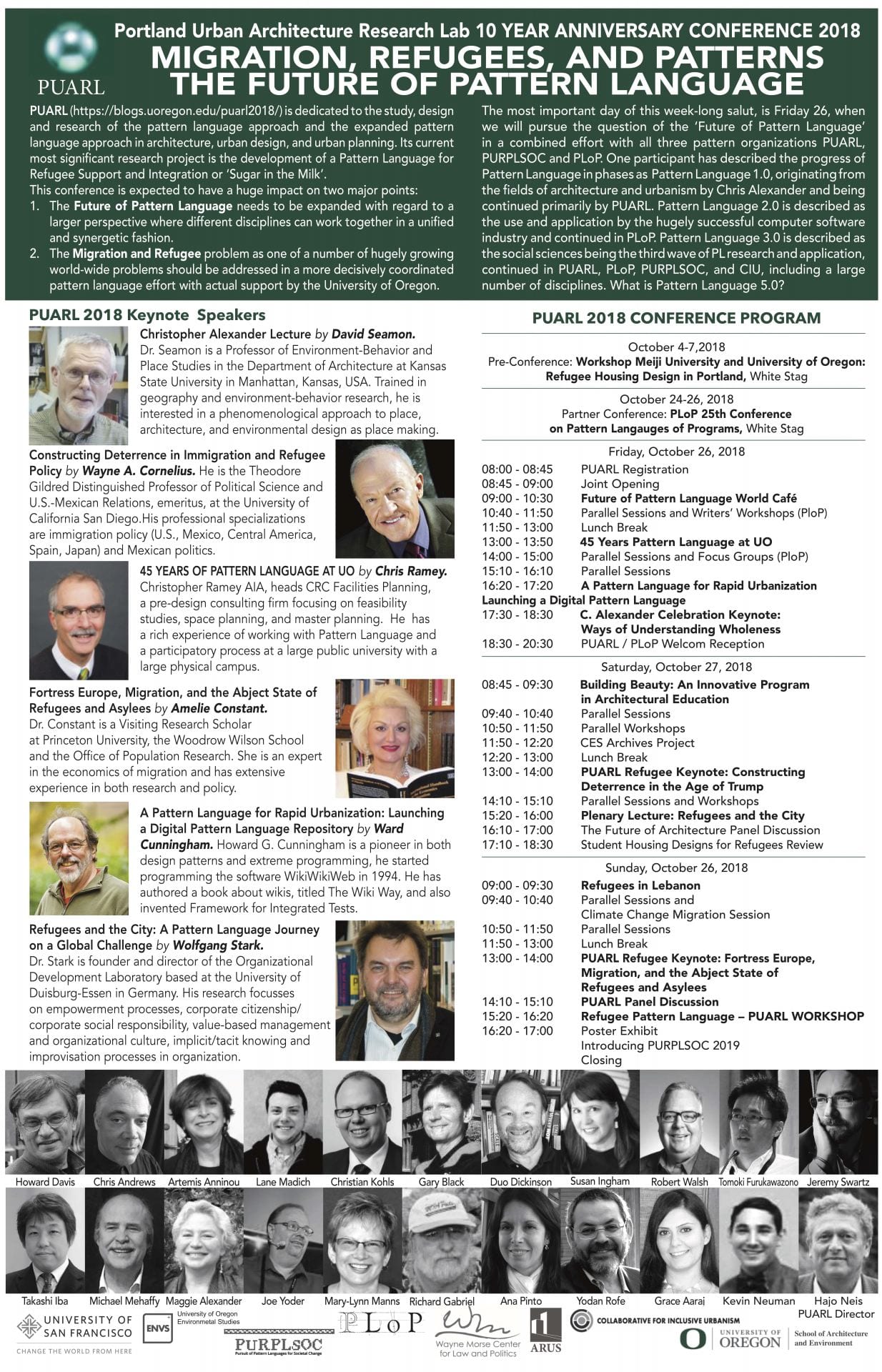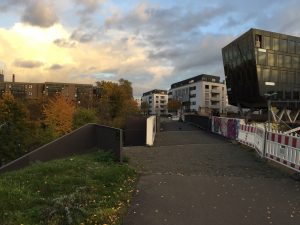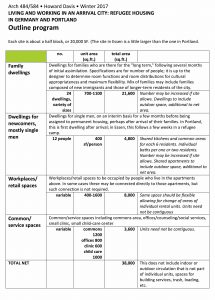June 29 – July 3, 2021 [Publication]
Presentation by Pamanee Chaiwat and Professor Hajo Neis at ISUF 2021 on June 29 – July 3, 2021: “RPL Cluster 8: The Refugee WORK and WORK-LEARNING”
The slide is here.
http://isuf2021.com/
June 24, 2021 [Related Research]
Presentation at 2021 ACSA/EAAE Teachers Conference
Teaching Agency in Adaptive Refugee Housing
Nancy Cheng, University of Oregon
Earl Mark, University of Virginia
Grace Aaraj, University of Oregon
Joachim Kieferle, Hochschule RheinMain
Marziah Rajabzadeh, University of Oregon
Ryan Maruyama, Behnisch Architekten
The paper is here.
You can see the video here
September 18, 2020 [Publication]
Presentation by Professor Hajo Neis and Pamanee Chaiwat, at PUARL+BB 2020 on September 18, 2020: “RPL: Refugees in neighborhoods and communities.”
The slide is here.
https://blogs.uoregon.edu/puarlbb2020/
September 1 – 4, 2020 [Publication]
Presentation by Professor Hajo Neis and Pamanee Chaiwat, at ISUF 2020 on September 1 – 4, 2020: “Cluster 7: Refugees HOUSING, LIVING, and LIVE-WORK.”
The slide is here.
http://isuf2020.cap.utah.edu/
October 25, 2019
Professor Hajo Neis finished leading the 2019 Rome Program of Global Education Oregon (GEO) from June to August. One of the research results is “REGINA COELI INCLUSIVE NEIGHBORHOOD: Urban Refugee Integration in Rome.”
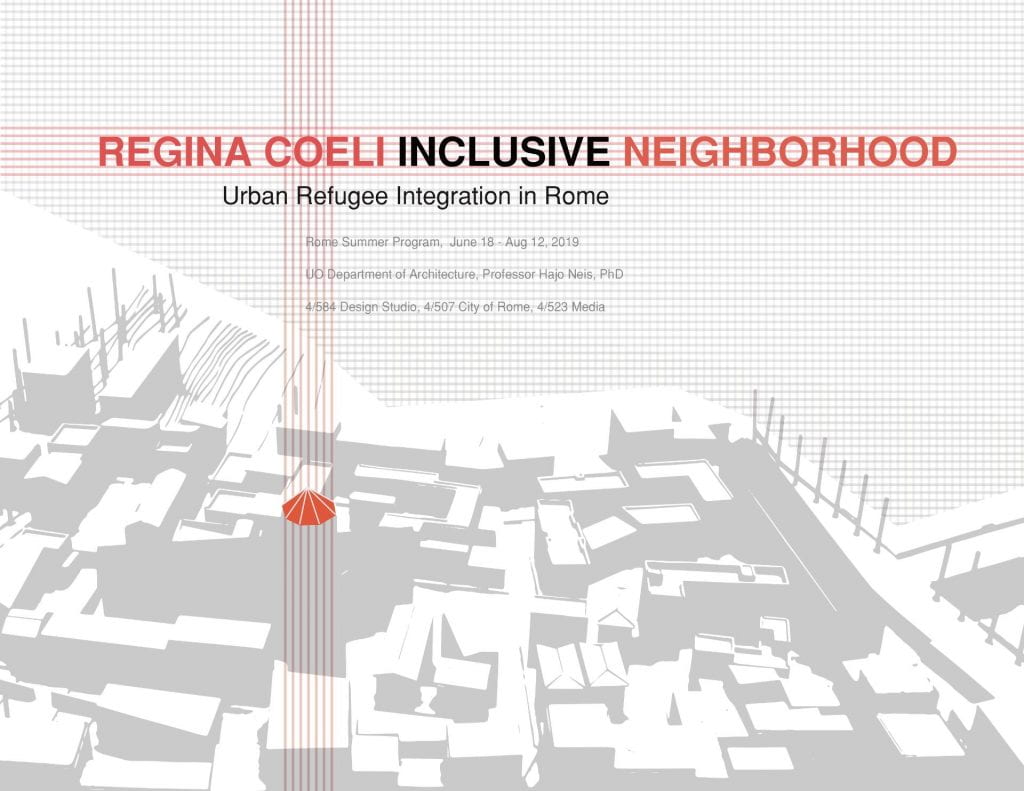
March 14, 2019
Presentation by Emily Ryba, a UO Student, at Industry Forum 2019 in Portland Art Museum on March 14, 2019: “Regenerative Design: Refugee Housing in Portland.”
https://www.csiresources.org/portlandchapter/event/industryforum
March 10, 2019
Professor Hajo Neis will lead the 2019 Rome Program of Global Education Oregon (GEO) from June to August. One of the courses in the program focuses on “Refugee Housing in the Eternal City.”
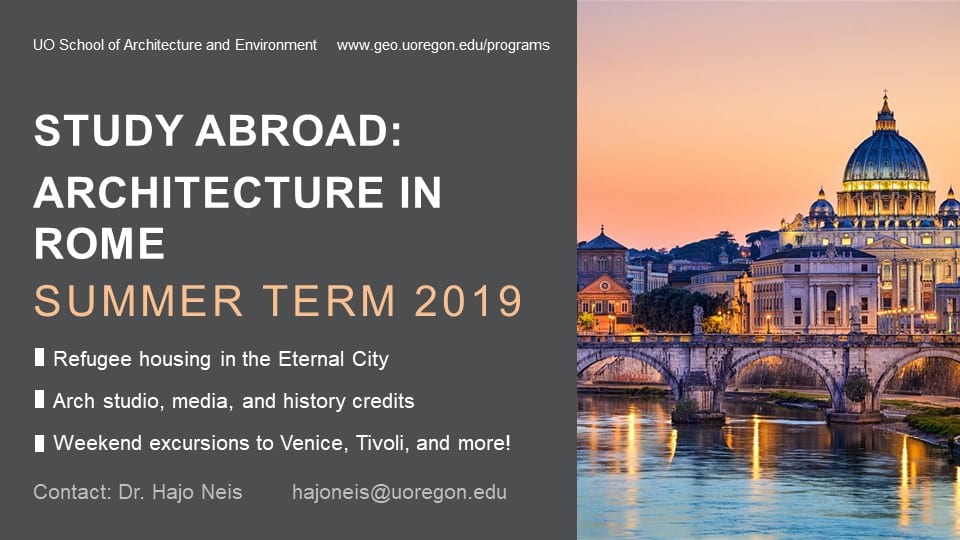
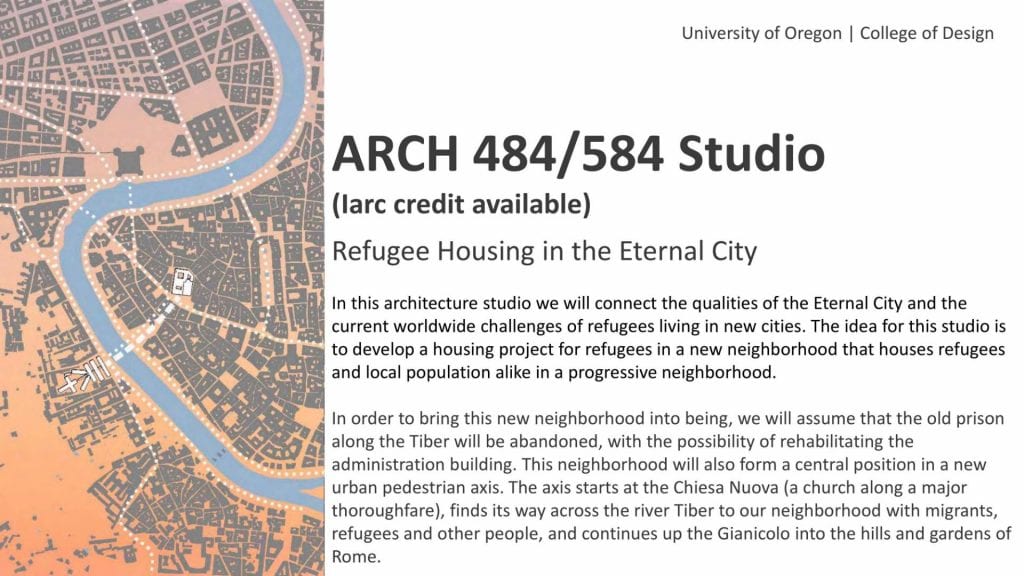
January 7, 2019
Professor Hajo Neis’s PUARL Research Seminar Winter 2019 starts at University of Oregon. (Course Description: click here ) The project for the Winter Quarter 2019 focuses on cluster Five of The Refugee Pattern Language: Neighborhoods for Refugees and possibly also cluster 6: Housing, Living, and Live-Work.
December 20, 2018 [Publication]
Research of Professor Hajo Neis, Briana Meier, and Tomoki Furukawazono has been published on the “Urban Planning” (ISSN: 2183-7635).
https://www.cogitatiopress.com/urbanplanning/article/view/1668
Neis, H., Meier, B., & Furukawazono, T. (2018). Welcome City: Refugees in Three German Cities. Urban Planning, 3(4), 101-115. doi:http://dx.doi.org/10.17645/up.v3i4.1668
Abstract: Since late 2015, the authors have studied the refugee crisis in Europe. In this article, we analyze local factors that are significant for urban planning to include in an integration plan through case studies in three cities in Germany. We have chosen to study Germany because of the country’s touted Willkommen Kultur (welcome culture), which was prompted in large part by Chancellor Angela Merkel’s “Flüchtlinge Willkommen” (“refugees welcome”) stance. Now, three years after Chancellor Merkel’s declaration to the world, although international and national policies set many parameters for refugee integration, responses to the uncertainty of the situation are fundamentally informed by local contexts. Germany has adopted a policy of distributing refugees to communities throughout the country according to the so-called “Königstein Key”, which sets quotas for each state according to economic capacity. We have selected case study cities and a county that are at different scales and regions: Borken in Hessen (13,500 people), Kassel County (200,000), and Essen, a larger city (600,000). Here we investigate the ways in which German citizens and refugees interact and integrate, with a focus on the social-spatial aspects of refugee experiences and the impacts on urban planning policy, urban morphology, building typology, and pattern language formation. Beyond crisis, we are looking at how refugees can and will try to integrate into their host countries, cities, and neighborhoods and start a new life and how host communities respond to refugee arrival. Urban architecture projects for housing and work opportunities that help the process of integration are part of this study. Particularly, in this article, we investigate the reality on the ground of the positive Willkommen Kultur and the high expectations and implied promises that were set in 2015 by Chancellor Angela Merkel and German society.
October 27, 2018 [Publication]
Presentation by Lane Madich, Rachel Lozeau, Angelo DeBlase, Professor Hajo Neis: “A Refugee Pattern Language – RPL Cluster 4: Arrival City: Urban Life, Buildings, and Infrastracture” at PUARL 10 Year Anniversary Conference in Portland.
https://refugee.uoregon.edu/pattern-language/
October 26-28, 2018
The Portland Urban Architecture Research Laboratory (PUARL) is celebrating its 10th Anniversary Conference on Oct. 26-28 focused on two themes: “The Future of Pattern Language” and “Migration, Refugees, and Patterns.”
This year we are celebrating the PUARL 10 Year Anniversary Conference in a week-long event including different organizations and critical topics all related to the study and promotion of pattern language projects, design, and research. A number of world leaders in this field will come to Portland to share their latest work.
The Program consists of three different parts:
- First, the Pattern Language of Projects Association (PLoP), will start the week with their own celebration program, October 24–25.
- Another two days are conducted by the Portland Urban Architecture Research Lab (PUARL), focusing on the currently rather critical topic of ‘Migration, Refugees, and Patterns,’ October 27–28.
- In a one-day overlap event on October 26, the two groups PUARL and (PLoP) (joined by PURPLSOC) will come together to explore the Future of Pattern Languages with project, design, and research proposals.
Dr. David Seamon will give the first-ever Christopher Alexander Lecture with the title, “Ways of Understanding Wholeness: Christopher Alexander’s work as synergistic relationality.” (This event is open to the public.)
We also celebrate 45 Years of Pattern Language application and research at the University of Oregon with a lecture by Chris Ramey on his own experience of 28 years as UO planning director.
Dr. Wayne Cornelius will give the PUARL Lecture, “Constructing Deterrence in the Sage of Trump.” Drs. Amelie Constant and Wolfgang Stark will portray the currently changing European refugee perspective.
Dr. Hajo Neis, the director of PUARL and organizer of the conference, expects this international meeting to have a considerable impact on two major points:
- The Future of Pattern Language needs to be expanded with regard to a larger perspective where different disciplines can work together in a unified and synergetic fashion.
- The Migration and refugee problem as one of a number of hugely growing world-wide problems should be addressed in a more decisively coordinated pattern language effort with actual support by the University of Oregon.
Find more information at the conference website.
https://calendar.uoregon.edu/event/puarl_10_year_anniversary_conference#.XEDnYs9KjOR
September 24, 2018
Professor Hajo Neis’s Architectue Design Studio for refugee housing in Portland starts at the beginning of Fall 2018 quarter at University of Oregon. (Course Description: click here )
July 7, 2018 [Publication]
Presentation by Professor Hajo Neis: “A Refugee Pattern Language – RPL Cluster 2: Leaving Place – Arrival Country” at XXV ISUF Conference in Krasnoyarsk city, Russia.
http://conf.sfu-kras.ru/en/isuf2018
May 9, 2018
UO students of Professor Howard Davis’s studio “Living in a New Land” have been awarded with three prizes of Place and Displacement: Integrating Refugee Populations within Cities competition sponsored by International Development in Action (IDeA). They took home 3 of the 17 prizes awarded—one first prize and two honorable mentions.
http://www.idevelopment.us/2018-results/
https://archenvironment.uoregon.edu/place-and-displacement-architecture-students-design-prize-winning-spaces-refugees
There will be an exhibition of them in PUARL 10 Year Anniversary Conference 2018.
https://blogs.uoregon.edu/puarl2018/
March 3, 2018
PUARL was awarded the $3,000 Interdisciplinary Environmental Studies Seed Grants of the University of Oregon.
November 13-14, 2017
Professor Hajo Neis visited the University of Duisburg-Essen to study and explore two urban sites in Essen as potential project sites for refugee live-work housing design projects for architecture students at the University of Oregon. His Italian doctoral student at the University of Essen Aurelio David helped in this intriguing exploration of two sites under development pressure. (see also attached boundary photo to site–Nov. 13-17)
October 19-21, 2017 [Publication]
Presentation by Professor Hajo Neis and Tomoki Furukawazono: “Arrival City: Refugees in Three + One German Cities” and”A REFUGEE PATTERN LANGUAGE: Cluster One – The Refugee Family ” at 2nd PURPLSOC World Conference 2017 in Krems, Austria.
https://refugee.uoregon.edu/pattern-language/
http://www.purplsoc.org/conference2017/
September 27-29, 2017 [Publication]
Presentation by Professor Hajo Neis: “Arrival City: Refugees in Three German Cities” at XXIV ISUF Conference in Valencia.
http://valencia2017isufh.com/
September 22, 2017
The $5,000 Yamauchi Studio Award was given to Professor Hajo Neis for exploring and developing refuges designs with his students in Portland Oregon, and Essen, Germany.
September 7, 2017
Professor Hajo Neis participated in the conference: Living/Housing without registration at German Architecture Museum in Frankfurt.
June 21-23, 2017
Poster presentation by Professor Hajo Neis at Interdisziplinäres Zentrum für Integrations- und Migrationsforschung (InZentIM) Conference 2017 in the University of Duisburg Essen.
http://www.inzentim.de/inzentim-kongress-2017/
February 6, 2017
Professor Hajo Neis, Tomo Furukawazono and Briana Meier participate in Professor Davis’ mid-review of the Refugee Housing Project in Essen/Germany and Portland/USA. The review took place in Eugene, Oregon. (Outline Program: click here )
January 27, 2017
President Donald Trump signs executive order: “Protection of the Nation from Foreign Terrorist Entry into the United States.” [link] The decree suspends the entire US refugee resettlement program for at least 120 days while tough vetting rules are established. Detentions started the same day in the US and people from muslim countries could not start their trips from abroad.
January 18, 2017
Skype presentation of German Refugees case studies to Eugene students by Hajo Neis, Briana Meier and Tomo Furukawazoneo at University of Oregon in Eugene and Portland
January 9, 2017
Professor Howard Davis’ Architectue Design Studio for refugee housing starts at the beginning of Winter quarter at University of Oregon in Eugene based on visit to Essen with Hajo Neis in December 2016. (Course Description: click here )
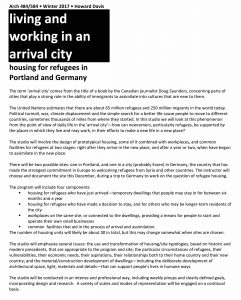
December 10-15, 2016
Professors Hajo Neis and Howard Davis visit the University of Duisburg-Essen in Germany to locate a feasible urban building site for a ‘Live-Work’ Housing Studio in the inner city of Essen.
October 29, 2016
Presentation of European Refugee Crisis at the International PUARL Conference in San Francisco, USF (Hajo Neis, Briana Meier and Tomo Furukawazono)
https://blogs.uoregon.edu/puarl2016/


